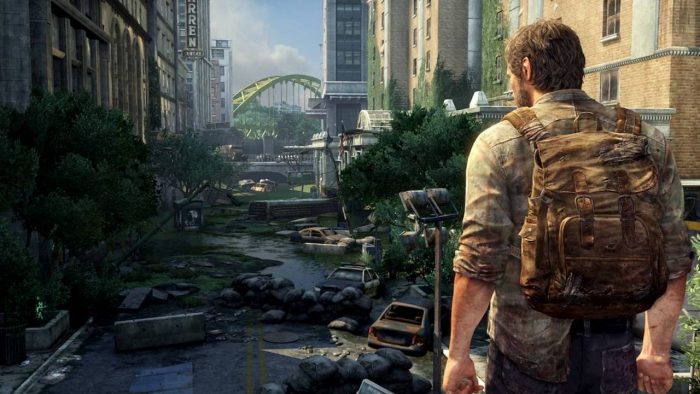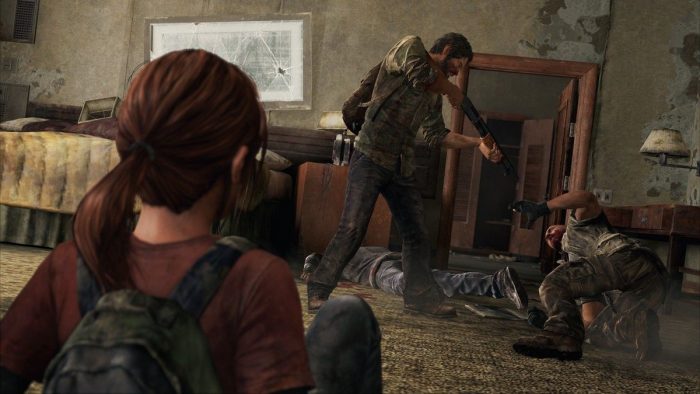The Last of Us is a hit no matter how you slice it. It received near perfect scores across the board from critics and sold ludicrously well. Almost everyone that plays it considers it a masterpiece of gameplay and storytelling, with its bleak post-apocalyptic setting and brutal combat. It even has a sequel coming soon, and I know that the majority of the people who played the first are eager for the second. So you might be wondering why I’m here today writing about this game. Surely I can’t really say anything that hasn’t been said before? Surely this game is beyond reproach, nearly perfect?
I recently got a Playstation 4 bundled with the remastered version of the game. I have since beaten it. And now I’m here to tell you how everyone is wrong, because I am clearly the be-all and end-all on whether or not a game is good. Join me, friends.
A Tired Apocalypse
The first issue I took with the game was the setting. These days, post-apocalyptic games are a dime a dozen with Fallout, STALKER, Wasteland, Xcom, among others doing pretty well. This doesn’t even mention the enormous popularity of everything The Walking Dead, including the drier-than-centuries-old-bones TV show, the far superior comic, and the rather stellar game series by the now defunct Telltale games. Speaking of the latter, The Last of Us is basically zombies with mushrooms.
It turns out that a particular kind of fungus named Cordyceps has mutated and started taking over people’s brains. After a rather effective opening showing the end of the world from Joel’s limited point of view, we are brought forward in time by twenty years to a future ravaged by the Cordyceps. Only small pockets of survivors litter the landscape, but most of the world has been reclaimed by nature, with entire cities crumbling and towns overrun with infected people.
In other words, it’s an entirely standard zombie apocalypse setting. You’ve seen it before. Only this time, there are mushrooms.

A Tale as Old as Time
The story mainly concerns itself with Joel, and his young charge Ellie, traveling across the country seeking the Fireflies, an independent militia who does things. It’s never actually made clear how they differ from the tyrannical and oppressive government agents that populate the early stages of the game. Either way, we learn very early on that Ellie is immune, with her having been bitten but remaining totally normal, so they’re going to the Fireflies so she can be studied.
Most post-apocalyptic and zombie fiction involves characters trying to get from one spot to the next. Often times, it’s the promise of safety and comfort driving them (Zombieland), while other times it’s an attempt to be rescued (Shaun of the Dead). In still others, it’s seeking a safe haven the characters can call their own (so many storylines from The Walking Dead). Now, there’s absolutely nothing wrong with sticking to a formula. Some really great movies, games, books, and TV shows follow well established formulas but manage to stand out thanks to interesting characters, huge twists, or a single unique idea. The Last of Us, though, kind of just goes through the motions.
The game is split into four distinct sections, and for lack of a better phrase, I’m going to refer to them as acts, similar to a movie or play. In the first act, we establish the overall conflict of Joel having to transport Ellie safely across the country. We also establish the danger present in the world, with plenty of bandit and guard encounters. In the second act, they reach an area they thought was safe, but are attacked and they’re forced to fend for themselves against the likes of more bandits and infected. In the third, they have a run in with someone they thought was okay but turns out to be psychotic (in the form of David, played by the seemingly omnipresent Nolan North). Then in the final act, they reach their destination, shenanigans go down, and they continue their life on the road.
I’ll get to why this doesn’t work as well as it could shortly, but the plot does very little to differentiate itself from better zombie fiction, like the 28 Days Later franchise. The “people you thought were okay but are actually bad guys” twist is extremely common for the genre, which thrives on the idea that humans are the worst kind of monsters. Don’t get me wrong, it can be an effective twist when used right (see the aforementioned Telltale Walking Dead games and how they dealt with cannibals in the first season), but here, it feels like so many other things we’ve seen.
The only way the game differentiates itself is with Joel’s final decision to save Ellie instead of sacrificing her so a vaccine can be made. The best drama arises when you put characters in a difficult situation, and I’ll admit that it’s a great move to put Joel in a position where he has to choose between saving Ellie and saving the world. He chooses the former option, dooming humanity for as far as the player knows (my money, though, is that Ellie will find a way to make it happen in the sequel). It’s a nice touch on an otherwise extremely standard zombie story.
A Lack of Character
I’ve seen much stink made about how great the connection between Ellie and Joel is, and how Ellie is one of gaming’s great female protagonists. I’m just gonna say it: I don’t get it. The game is structured as a semi-linear adventure where there’s usually one right way to go, which can be found after exploring a bit. The thing about games is that you can use the slower moments in between huge story beats to develop characters through banter. Red Dead Redemption, The Walking Dead, Evil Within 2, and more use their travel segments to have conversations and exposition unfold between characters. It gives you a good idea of who they are and makes you grow more attached to them. It’s one of the huge advantages of gaming- you can spend so much more time with a character than in a movie and TV show.
The Last of Us does this with none of its characters, though. Early on, Joel’s partner Tess sacrifices herself to hold off some soldiers so Joel and Ellie can escape. It’s supposed to be an intense, emotionally charged moment. The problem is that we don’t know Tess as a person. Aside from her willingness to commit horrific acts of violence against anybody who gets in her way (more on this shortly), Tess receives no characterization. Sure, we’re told her and Joel have a history, and she has a moment of self-awareness before dying where she (rightly) comments that neither her or Joel are good people, but we never see Tess being herself. We never see downtime between her and Joel, never hear them just shoot the breeze. It’s critical in stories like this for the writers to show what characters are like before stuff starts going down. It’s how you make people sympathize.
The same holds true for the rest of the cast. Much time is spent simply wandering around with Joel and Ellie, and outside a very, very few certain instances, we don’t hear them simply talk or interact in a way that isn’t related to their immediate circumstances. The down time between the action would have been a great chance to hear some banter, of them getting to know each other, but any time Ellie tries and ask Joel about his history, he immediately shuts her down and they usually remain quiet. There are a few scripted cut scenes where we see Ellie being a normal kid, but I can count them on one hand (the only one that comes to mind, two days after finishing the game, is when she and Joel are driving and she pulls out the porno mag). The opportunities are wasted on dialogue like “Hey, I think we can use that ladder,” and “Let’s go around it.” And this leads me to perhaps the most egregious error in the game…

A Separation of Story and Gameplay
In the very beginning of the game, Joel and Tess go after a man named Robert, who apparently has their guns. He has a small gang of muscle he puts between them and him, Joel and Tess wipe them all out, and they proceed to interrogate him via beatings and limb breaking.
If you weren’t told that Joel was the protagonist, who would you sympathize with here?
Robert, as it turns out, was right to fear them. They are violent individuals, and there’s nothing at all wrong with a morally grey/ evil protagonist. But the game has a severe disconnect between its gameplay and storytelling. See, the two butt heads constantly. In a zombie movie, a scene like the one with Robert could be used early on to establish how far gone the protagonists are. Or it could show how they’re able to take the extra step in this harsh world, but maybe they’re conflicted about it. By the time Robert is interrogated and eventually executed, Joel and Tess have killed people numbering in the double digits. After all, a game has to have gameplay right?
This is even more apparent in the game’s third act, with everything involving David and his group of psychos. With Joel injured and sick, the player takes the reigns of Ellie for a good chunk of the section. It at least uses its gameplay to make the player trust David, with the two characters having to hold out against a horde of infected (or runners, as the game calls them, because everyone is afraid to call them zombies). This makes his betrayal later on more effective. However, Ellie subsequently escapes by sticking a cleaver in a dude’s neck, then proceeds to sneak around the snowy seaside town, gunning men down, as well as viciously stabbing them over and over again until they die. Like in the opening example with Robert, Ellie’s body count in this section alone climbs into double digits.
But then the game has Ellie kill David by hacking into his face with a machete. She loses control of herself, going really far with the weapon, and Joel has to pull her off the corpse while she cries and breaks down at what she did.
Excuse me?
Up to this point, both Joel and Ellie have single-handedly wiped out entire groups of militia and bandits, and in rather brutal fashion I might add. Ellie is no stranger to violence. She has been in several life threatening situations and done her fair share of killing. But the game expects me to believe that she would break down over killing this one guy? Sure, he was planning on eating her, but again, all the other men in the game were planning on either raping or outright killing her. The gameplay up to that point totally robs the scene of its desired impact.
And ultimately, that’s the biggest problem with this game. Joel and Ellie are so flippant about killing that it makes the scenes where the violence is supposed to be shocking fall entirely flat. It makes them both into complete psychopaths, especially in a much later scene involving Joel interrogating some more men.
And as a final nitpick, for a game called The Last of Us, which I assume refers to humanity, there are a ton of people willing to throw their lives down just to try and kill a man and teenage girl. An almost laughable amount. Take David again. It turns out you killed a group of his men (at least 20 of them) earlier in the game, which is why he turns on you. He says that he has a group that looks out for themselves. And yet, in the course of this part of the storyline, you kill probably 100 of his men, at least. Exactly how many people does he have under his command? Having that many robs the game of the mood it tries to convey, which is that of humanity on its last breath. There are, simply put, too many people around.
It’s All Rather Dull
Even ignoring the disconnect between story and gameplay, the gameplay itself is…kind of dull. When you aren’t simply walking around, you’re solving what I can only imagine someone on the development team referred to as “environmental puzzles.” Only the thing is that these puzzles always boil down to either:
- Finding a ladder to cross a gap
- Finding a ladder to climb a wall
- Finding a ladder to cross a gap then climb a wall
- Finding a pallet to transport Ellie across water, then flipping a switch
- Find a pallet to transport Ellie across water to get to a ladder you use to cross a gap so that you can flip a switch
The “puzzles” are insultingly simple, and never interesting or fun. But it’s all the developers could think of to break up the pace between the okay-tier stealth shooting segments. Admittedly, these sections can get quite tense, with fantastic sound design emphasizing every bullet fired and every punch connected. The AI isn’t great, but there’s at least a visceral satisfaction that comes from the hyper gory gun play, even if it does clash with the story. But even then, those sections feel token, like the developers put them in their to justify the too-long run time. In other words, most of the gameplay feels like padding between story beats for a story which, as we’ve established, does next to nothing to stand out in an overcrowded sub-genre. The Evil Within games suffer from some of the same problems, and borrow many of the survival mechanics from The Last of Us, but those at least have really creative horror aesthetics and atmosphere going for them, which makes the gameplay more engaging than it is here.

Here At the End
Contrary to my snarky comment at the beginning of this article, I don’t begrudge anyone liking this game. It’s not bad by any means, but for me, it did little to set itself apart from other games and stories in the sub-genre. To me, the gameplay was very standard, and it clashed with the rather basic and generic story in a way that left me wondering what exactly I was supposed to be thinking during a given moment. I don’t really understand the hype behind it, or why many hold it up as the pinnacle of video game storytelling. Other games, like LISA: The Painful, tackle similar themes in much more interesting ways that take better advantage of the video game medium.
Who knows? Maybe one day down the road I’ll give it another shot and it’ll click with me more. But right now, I just do not get it.
You may get out your torches and pitchforks now.



When it came out on PS3 I thought it was the best game I’ve ever played, but that was seven years ago. Games have evolved so much that in hindsight this game is very simplistic and lacking even. I have played it a total of three times and just finished it on PS4, my conclusion is that it’s still very fun to play, but only because it’s a trip down memory lane for me. This game is not up to today’s standards and Uncharted 4 far surpassed it in my opinion. Let’s see how the brand new sequel is. I trust Naughty Dog to hit a home run.
I tried on PS3, and I tried again on PS4 but this game didn’t click for me.
Something about it kept me playing, but every time one of those stupid ladder puzzles popped up, my eyes rolled back in my head and I thought “GOTY EVERY YEAR.”
I tried playing this game a couple time but never made it more than an hour in before losing interest. I can get why people are into it, but it’s not for me and that’s ok.